Unit 3 Could you please tell me where the restrooms are Section B(教学课件)(共35页PPT,无素材)-初中英语人教版九年级全一册
文档属性
| 名称 | Unit 3 Could you please tell me where the restrooms are Section B(教学课件)(共35页PPT,无素材)-初中英语人教版九年级全一册 |
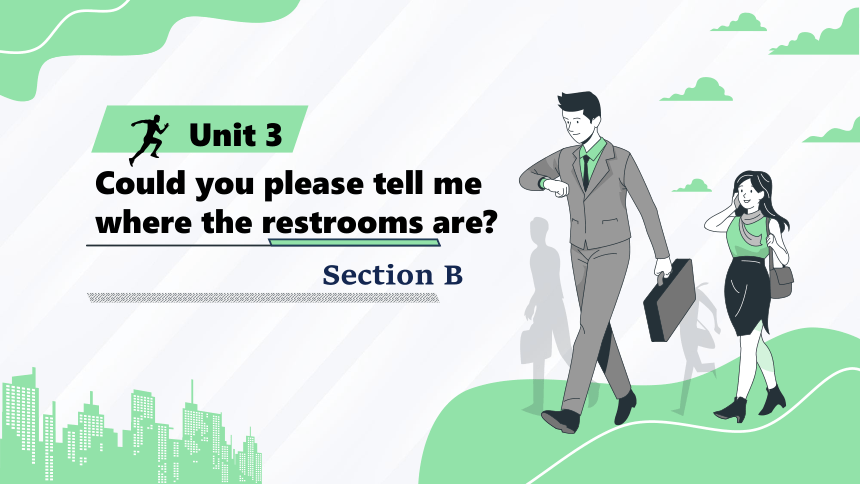
|
|
| 格式 | pptx | ||
| 文件大小 | 3.1MB | ||
| 资源类型 | 教案 | ||
| 版本资源 | 人教新目标(Go for it)版 | ||
| 科目 | 英语 | ||
| 更新时间 | 2024-09-03 00:00:00 | ||
图片预览

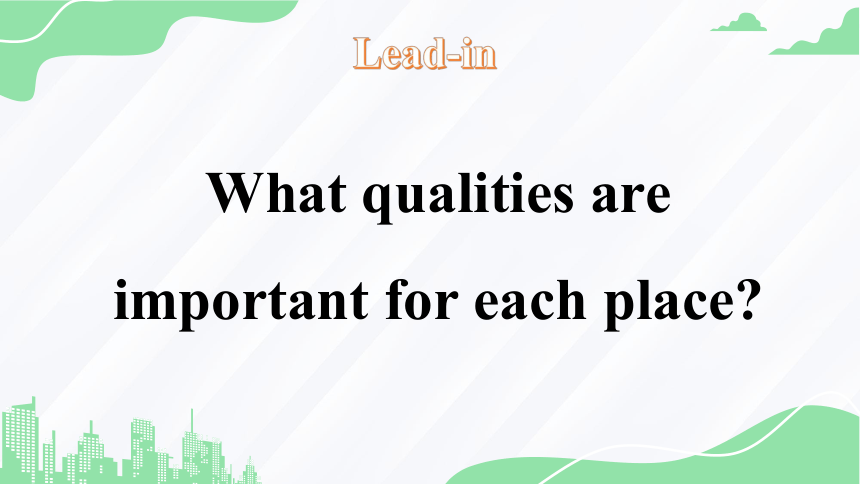
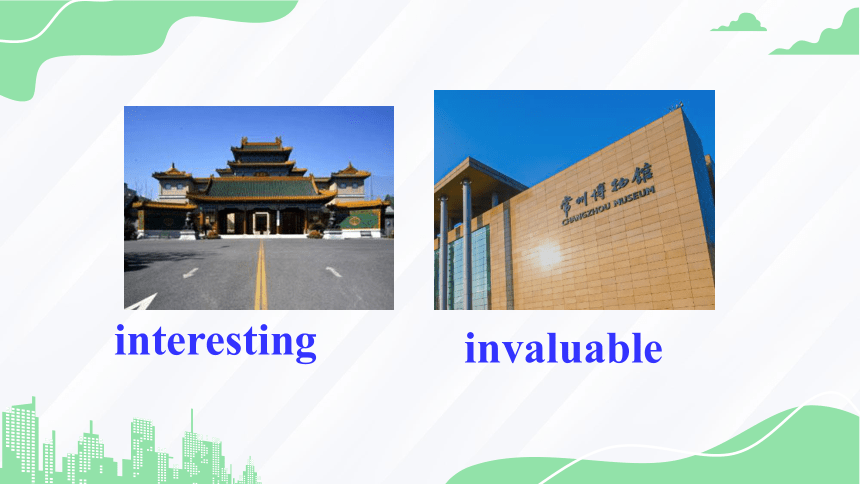
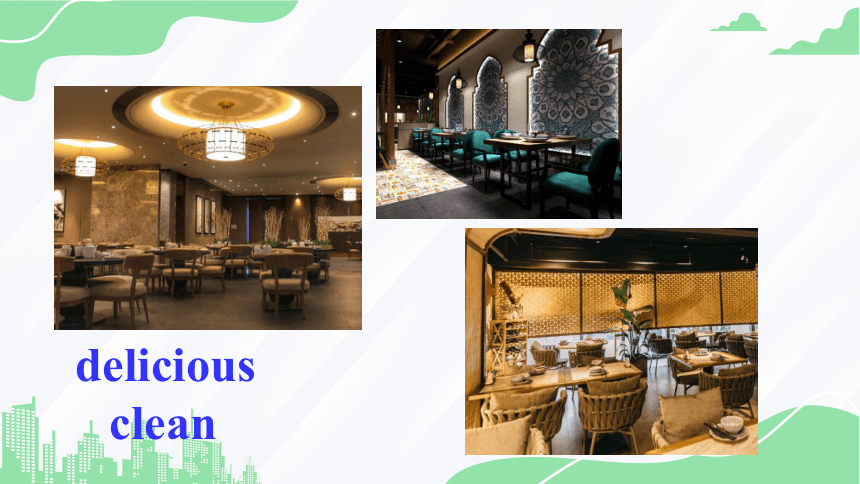
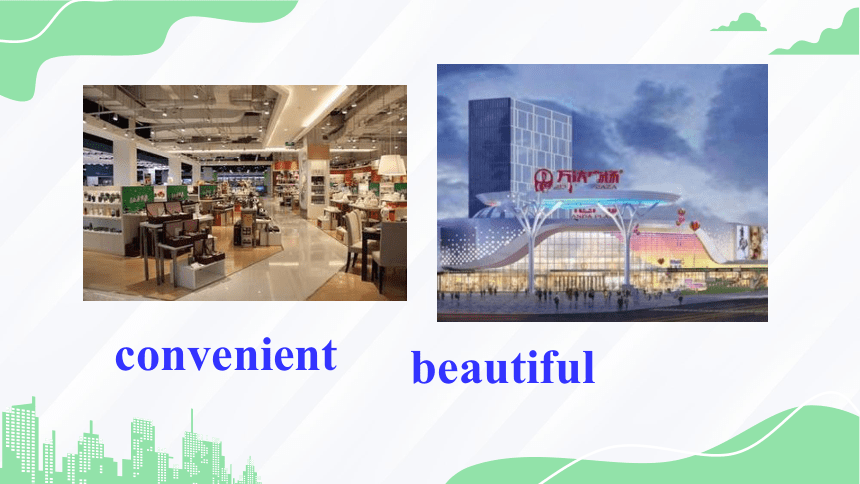
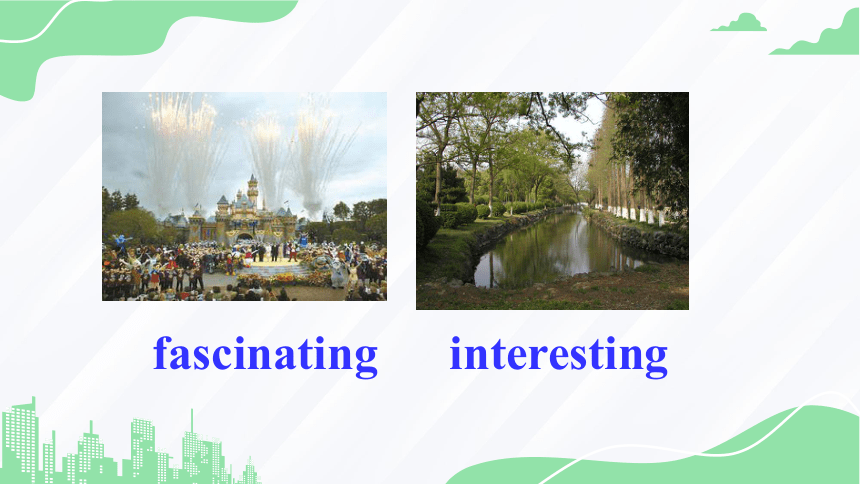
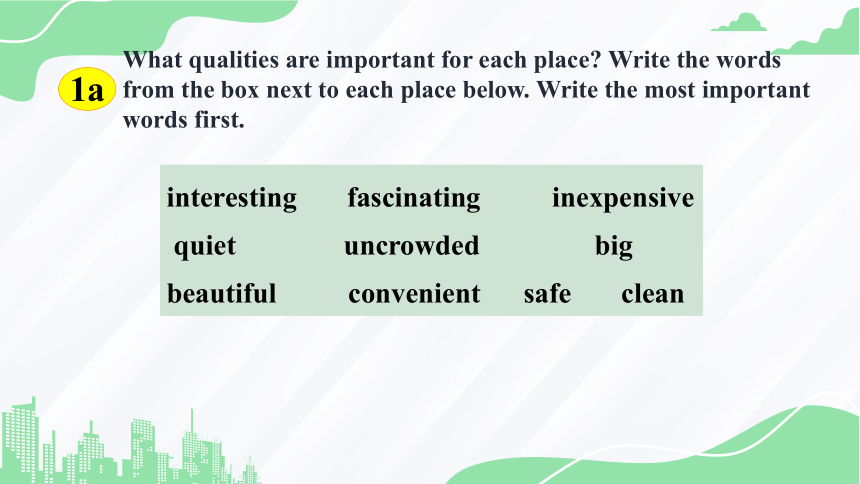
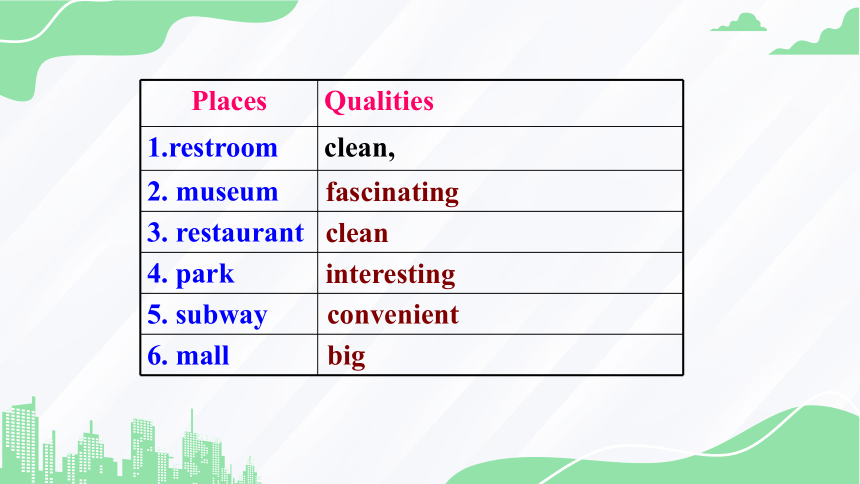
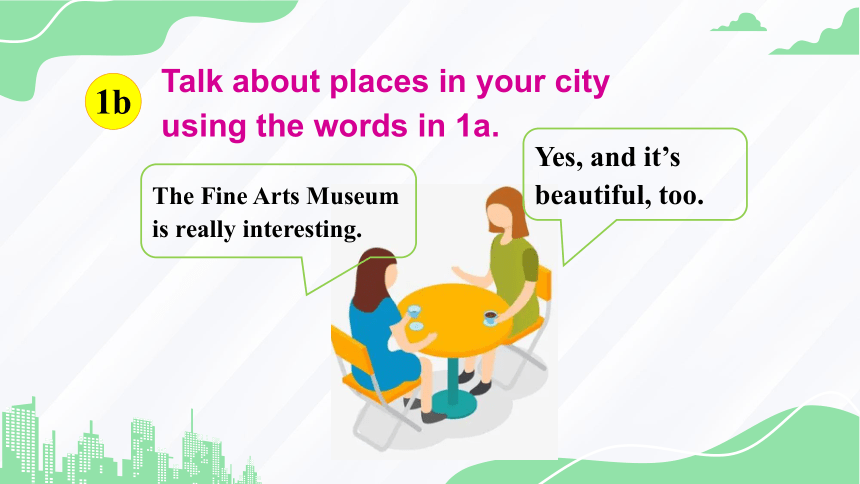
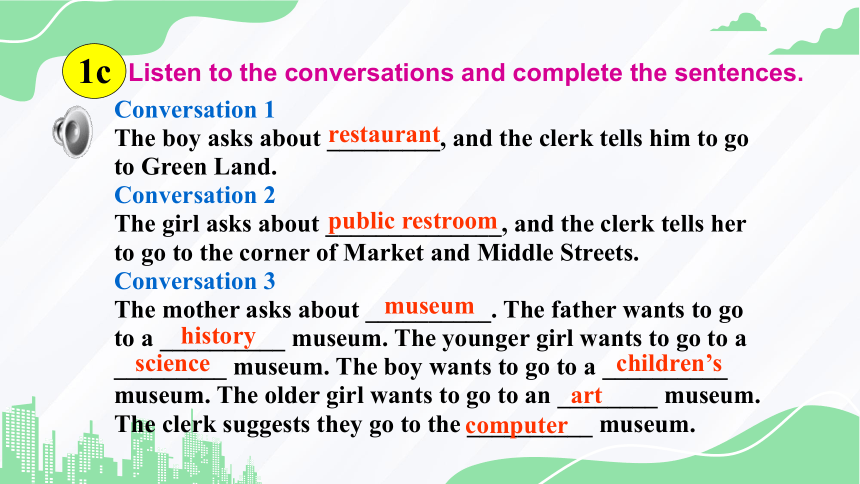
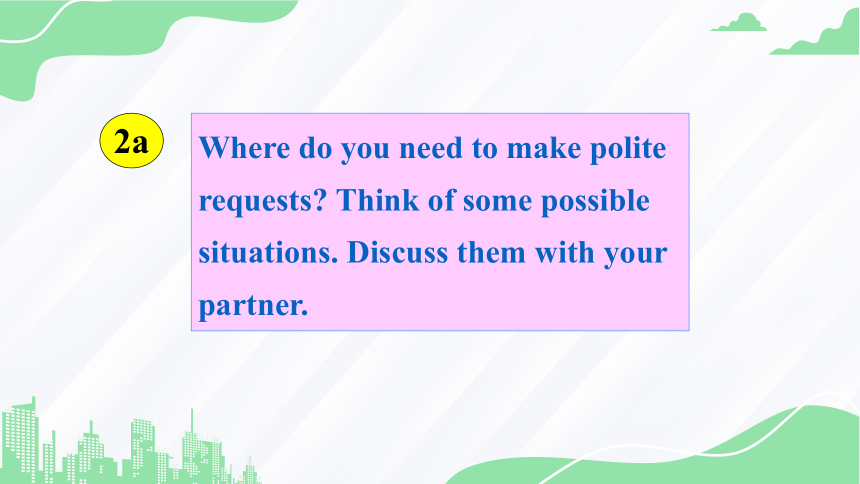
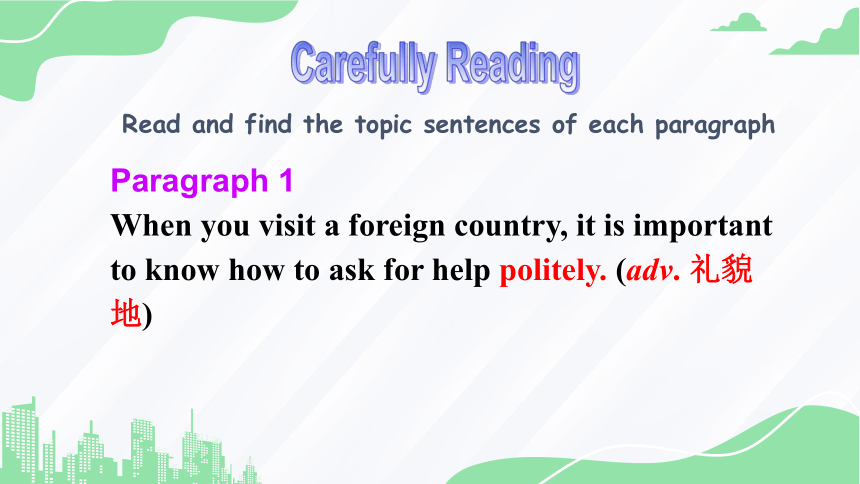
文档简介
(共34张PPT)
Could you please tell me where the restrooms are
Unit 3
Section B
Lead-in
What qualities are important for each place
interesting
invaluable
delicious
clean
convenient
beautiful
fascinating
interesting
1a
What qualities are important for each place Write the words from the box next to each place below. Write the most important words first.
interesting fascinating inexpensive
quiet uncrowded big beautiful convenient safe clean
Places Qualities
1.restroom clean,
2. museum
3. restaurant
4. park
5. subway
6. mall
fascinating
clean
interesting
convenient
big
1b
Talk about places in your city using the words in 1a.
The Fine Arts Museum is really interesting.
Yes, and it’s beautiful, too.
1c
Listen to the conversations and complete the sentences.
Conversation 1
The boy asks about _________, and the clerk tells him to go to Green Land.
Conversation 2
The girl asks about ______________, and the clerk tells her to go to the corner of Market and Middle Streets.
Conversation 3
The mother asks about __________. The father wants to go to a __________ museum. The younger girl wants to go to a _________ museum. The boy wants to go to a __________ museum. The older girl wants to go to an ________ museum. The clerk suggests they go to the __________ museum.
restaurant
public restroom
museum
history
science
children’s
art
computer
Where do you need to make polite
requests Think of some possible
situations. Discuss them with your
partner.
2a
Carefully Reading
Read and find the topic sentences of each paragraph
Paragraph 1
When you visit a foreign country, it is important to know how to ask for help politely. (adv. 礼貌地)
Paragraph 2
Good speakers change the way they speak in different situations. …
Paragraph 3
Usually polite questions are longer.
Paragraph 4
However, it is important to learn how to use the right language in different situations.
Read the following sentences about the passage and give the correct logical order.
importance of language appropriacy
features of polite language
seems difficult, but still important
what is language appropriacy
____ _____ _____ _____
a d b c
Read again and discuss these questions
Is it enough to speak correctly
What are the features of polite language
Is it necessary to ask indirect questions to all the people around you
4. In the second picture, why does the man say “Sorry, I can’t help you.” Can you change the question to a more polite one
5. What is the writer’s purpose
2c
Find all the direct questions and polite requests from the passage.
Direct questions Polite requests
Where are
the restrooms
1. Could you please tell me where the restrooms are
Direct questions Polite requests
2. When is the
school trip
3. Peter, tell me
your e-mail
address.
4. Where’s the
post office
2. Excuse me, Mr. West. Do you know when the school trip is
3. Peter, could you please tell me
your e-mail address
4. Pardon me, could you please tell me where to park my car
2d
Read the requests below. In the second column, write A if you would say it to someone you know and B if you would say it to a stranger. In the last column, write where you think these people are.
Request Person Place
1. Will you pass the salt
2. Do you know where I can change some money, please
3. Could you tell me what just happened
4. Can you please tell me where the nearest station is
A
B
A/B
B
home
street
any public place/home
street
Request Person Place
5. Excuse me, do you know what time it begins, please
6. Let me know when you’re ready, OK
7. Could you possibly tell me the way to the village school
B
A
B
movie theater
home
street
Writing
【写作话题】
本单元围绕“Ask for information politely”这一话题展开教学活动,帮助学生了解
有礼貌地询问信息的重要性,并且学会向他人询问信息时的常用句型
【写作技巧】
(1)本单元的话题是“Ask for information politely,因此要紧紧围绕这个中心话
题进行写作。
(2)从涉及的内容来看,当我们游览一个国家时我们需灵活运用如何礼貌地请求帮助的句型
Writing
(3)常用句型
Excuse me, do you know where I can buy some medicine
Could you please tell me how to get to the post office
Could you tell us when the band starts playing this evening
Excuse me, do you know what time it begins
【写作模板】
开头——表明写信的目的
...will leave for..., so we are going to...
中间——介绍聚会的地点及具体路线
It is... to find..
Turn right at...
There is...
结尾——表达自己的希望
Hope you can...
3a
Imagine you are going on a short study vacation at a school in an English- speaking country. What would you like to know before you go Write some polite, indirect questions about the following topics.
Topic Question
The course you will study
The time of the course
Where and what you can eat
Where you will stay
Could you please send me the introduction of the courses
Could you tell me how long the course lasts
Do you know where students usually eat and what kind of food they eat
Could I find out more about where students can stay, please
Topic Question
What activities you can do
Travel to the school
Other
Can you please tell me the kinds of activities students can do
Could you please tell me how students usually travel to school
Could you tell me how much the course costs
Language points
1. I'd like to know about...我想知道有关......
would like 意为“想想要”与want同义但在语气上比 want 更委婉,would like的用法主要有:
(1)would like sth.想要某物
例:I'd like some apples.我想要一些苹果
(2)would like to do sth.想要做某事
He'd like to go to the supermarket.他想去超市
(3)would like sbto do sth.想要某人做某事
She'd like me to go shopping with her.她想要我和她一起去购物
知识拓展
would like 无人称和数的变化,一般疑问句把 would 提到主语之前
Would you like... 问句的回答:
肯定回答多用 Yes,please./Yes,I'd/We'd like/love to./Certainly./Yes,thank you.等;
否定回答常用 No thanks./No ,thank you.
Language points
2. thank the person for helping you.感谢这个人帮助你
要点精析
thank sb, for(doing )sh.意为“因(做)某事而感谢某人”,其中for 为介词
后跟名词、代词或动词-ing 形式作宾语
thank you for ( doing ) sth.相当于 thanks for ( doing )sth.
例:Thank the boy for his advice.谢谢那个男孩儿给的建议。
知识拓展
thanks to sb./sth.表示“多亏;因为;由于”的意思
例 : Thanks to Mr. Zhang. He made great progress in English
多了张老师,他的英语取得了很大的进步
Language points
3. The expressions they use might depend on whom they are speaking to or how well they know each other. 他们使用的表达方式可能取决于他们和谁说话或他们对彼此的熟悉程度
要点精析 1
They use 是省略了关系代词 that或which 的定语从句,修饰先行词 the expressions,表示“他们使用的表达方式”定语从句要放在它所修饰的词的后面
例 : The people who called yesterday want to buy the house昨天打来电话的人想买这座房子
要点精析 2
whom they are speaking to or how well they know each other是由 whom 和how引导的宾语从句,作on的宾语,宾语从句用陈述语序。
例 : He didn't tell me when we would meet and where we would eat
他没有告诉我我们将何时见面及在哪里吃饭
Vocabulary
1. politely
polite (adj.有礼貌的)
反义词impolite(adj.无礼的)
练习: She speaks to everyone ________.
politely
Vocabulary
2. request
make a request(for sth.)要求/请求(某事物)
request sth.from sb.“向某人请求/要求某事物”
request sb.to do sth.“请求/要求某人做某事”
练习:Mr. Smith refused their ________ for a meeting!
request
Vocabulary
3. direction
在此处指“对行路方向的)指引”,这一用法时它常用复数形式,常与give,ask,for等动词(短语)及介词 to 搭配
练习:Let's stop and ask for ________.
direction
Vocabulary
4. spend
spend...(in) doing sth.( 花费......做某事)
spend.on sth.( 在某事/某物上花费......)
练习:I ________ two hours(in) reading the novel.
spent
Vocabulary
5. look forward to
look forward to doing sth期盼做某事
练习:I'm looking forward ________ receiving your letter.
to
Thanks for your watching
Could you please tell me where the restrooms are
Unit 3
Section B
Lead-in
What qualities are important for each place
interesting
invaluable
delicious
clean
convenient
beautiful
fascinating
interesting
1a
What qualities are important for each place Write the words from the box next to each place below. Write the most important words first.
interesting fascinating inexpensive
quiet uncrowded big beautiful convenient safe clean
Places Qualities
1.restroom clean,
2. museum
3. restaurant
4. park
5. subway
6. mall
fascinating
clean
interesting
convenient
big
1b
Talk about places in your city using the words in 1a.
The Fine Arts Museum is really interesting.
Yes, and it’s beautiful, too.
1c
Listen to the conversations and complete the sentences.
Conversation 1
The boy asks about _________, and the clerk tells him to go to Green Land.
Conversation 2
The girl asks about ______________, and the clerk tells her to go to the corner of Market and Middle Streets.
Conversation 3
The mother asks about __________. The father wants to go to a __________ museum. The younger girl wants to go to a _________ museum. The boy wants to go to a __________ museum. The older girl wants to go to an ________ museum. The clerk suggests they go to the __________ museum.
restaurant
public restroom
museum
history
science
children’s
art
computer
Where do you need to make polite
requests Think of some possible
situations. Discuss them with your
partner.
2a
Carefully Reading
Read and find the topic sentences of each paragraph
Paragraph 1
When you visit a foreign country, it is important to know how to ask for help politely. (adv. 礼貌地)
Paragraph 2
Good speakers change the way they speak in different situations. …
Paragraph 3
Usually polite questions are longer.
Paragraph 4
However, it is important to learn how to use the right language in different situations.
Read the following sentences about the passage and give the correct logical order.
importance of language appropriacy
features of polite language
seems difficult, but still important
what is language appropriacy
____ _____ _____ _____
a d b c
Read again and discuss these questions
Is it enough to speak correctly
What are the features of polite language
Is it necessary to ask indirect questions to all the people around you
4. In the second picture, why does the man say “Sorry, I can’t help you.” Can you change the question to a more polite one
5. What is the writer’s purpose
2c
Find all the direct questions and polite requests from the passage.
Direct questions Polite requests
Where are
the restrooms
1. Could you please tell me where the restrooms are
Direct questions Polite requests
2. When is the
school trip
3. Peter, tell me
your e-mail
address.
4. Where’s the
post office
2. Excuse me, Mr. West. Do you know when the school trip is
3. Peter, could you please tell me
your e-mail address
4. Pardon me, could you please tell me where to park my car
2d
Read the requests below. In the second column, write A if you would say it to someone you know and B if you would say it to a stranger. In the last column, write where you think these people are.
Request Person Place
1. Will you pass the salt
2. Do you know where I can change some money, please
3. Could you tell me what just happened
4. Can you please tell me where the nearest station is
A
B
A/B
B
home
street
any public place/home
street
Request Person Place
5. Excuse me, do you know what time it begins, please
6. Let me know when you’re ready, OK
7. Could you possibly tell me the way to the village school
B
A
B
movie theater
home
street
Writing
【写作话题】
本单元围绕“Ask for information politely”这一话题展开教学活动,帮助学生了解
有礼貌地询问信息的重要性,并且学会向他人询问信息时的常用句型
【写作技巧】
(1)本单元的话题是“Ask for information politely,因此要紧紧围绕这个中心话
题进行写作。
(2)从涉及的内容来看,当我们游览一个国家时我们需灵活运用如何礼貌地请求帮助的句型
Writing
(3)常用句型
Excuse me, do you know where I can buy some medicine
Could you please tell me how to get to the post office
Could you tell us when the band starts playing this evening
Excuse me, do you know what time it begins
【写作模板】
开头——表明写信的目的
...will leave for..., so we are going to...
中间——介绍聚会的地点及具体路线
It is... to find..
Turn right at...
There is...
结尾——表达自己的希望
Hope you can...
3a
Imagine you are going on a short study vacation at a school in an English- speaking country. What would you like to know before you go Write some polite, indirect questions about the following topics.
Topic Question
The course you will study
The time of the course
Where and what you can eat
Where you will stay
Could you please send me the introduction of the courses
Could you tell me how long the course lasts
Do you know where students usually eat and what kind of food they eat
Could I find out more about where students can stay, please
Topic Question
What activities you can do
Travel to the school
Other
Can you please tell me the kinds of activities students can do
Could you please tell me how students usually travel to school
Could you tell me how much the course costs
Language points
1. I'd like to know about...我想知道有关......
would like 意为“想想要”与want同义但在语气上比 want 更委婉,would like的用法主要有:
(1)would like sth.想要某物
例:I'd like some apples.我想要一些苹果
(2)would like to do sth.想要做某事
He'd like to go to the supermarket.他想去超市
(3)would like sbto do sth.想要某人做某事
She'd like me to go shopping with her.她想要我和她一起去购物
知识拓展
would like 无人称和数的变化,一般疑问句把 would 提到主语之前
Would you like... 问句的回答:
肯定回答多用 Yes,please./Yes,I'd/We'd like/love to./Certainly./Yes,thank you.等;
否定回答常用 No thanks./No ,thank you.
Language points
2. thank the person for helping you.感谢这个人帮助你
要点精析
thank sb, for(doing )sh.意为“因(做)某事而感谢某人”,其中for 为介词
后跟名词、代词或动词-ing 形式作宾语
thank you for ( doing ) sth.相当于 thanks for ( doing )sth.
例:Thank the boy for his advice.谢谢那个男孩儿给的建议。
知识拓展
thanks to sb./sth.表示“多亏;因为;由于”的意思
例 : Thanks to Mr. Zhang. He made great progress in English
多了张老师,他的英语取得了很大的进步
Language points
3. The expressions they use might depend on whom they are speaking to or how well they know each other. 他们使用的表达方式可能取决于他们和谁说话或他们对彼此的熟悉程度
要点精析 1
They use 是省略了关系代词 that或which 的定语从句,修饰先行词 the expressions,表示“他们使用的表达方式”定语从句要放在它所修饰的词的后面
例 : The people who called yesterday want to buy the house昨天打来电话的人想买这座房子
要点精析 2
whom they are speaking to or how well they know each other是由 whom 和how引导的宾语从句,作on的宾语,宾语从句用陈述语序。
例 : He didn't tell me when we would meet and where we would eat
他没有告诉我我们将何时见面及在哪里吃饭
Vocabulary
1. politely
polite (adj.有礼貌的)
反义词impolite(adj.无礼的)
练习: She speaks to everyone ________.
politely
Vocabulary
2. request
make a request(for sth.)要求/请求(某事物)
request sth.from sb.“向某人请求/要求某事物”
request sb.to do sth.“请求/要求某人做某事”
练习:Mr. Smith refused their ________ for a meeting!
request
Vocabulary
3. direction
在此处指“对行路方向的)指引”,这一用法时它常用复数形式,常与give,ask,for等动词(短语)及介词 to 搭配
练习:Let's stop and ask for ________.
direction
Vocabulary
4. spend
spend...(in) doing sth.( 花费......做某事)
spend.on sth.( 在某事/某物上花费......)
练习:I ________ two hours(in) reading the novel.
spent
Vocabulary
5. look forward to
look forward to doing sth期盼做某事
练习:I'm looking forward ________ receiving your letter.
to
Thanks for your watching
同课章节目录
- Unit 1 How can we become good learners.
- Section A
- Section B
- Unit 2 I think that mooncakes are delicious!
- Section A
- Section B
- Unit 3 Could you please tell me where the restroom
- Section A
- Section B
- Unit 4 I used to be afraid of the dark.
- Section A
- Section B
- Unit 5 What are the shirts made of?
- Section A
- Section B
- Review of Units 1-5
- Unit 6 When was it invented?
- Section A
- Section B
- Unit 7 Teenagers should be allowed to choose their
- Section A
- Section B
- Unit 8 It must belong to Carla.
- Section A
- Section B
- Unit 9 I like music that I can dance to.
- Section A
- Section B
- Unit 10 You're supposed to shake hands.
- Section A
- Section B
- Review of Units 6-10
- Unit 11 Sad movies make me cry.
- Section A
- Section B
- Unit 12 Life is full of the unexpected
- Section A
- Section B
- Unit 13 We're trying to save the earth!
- Section A
- Section B
- Unit 14 I remember meeting all of you in Grade 7.
- Section A
- Section B
- Review of Units 11-14
